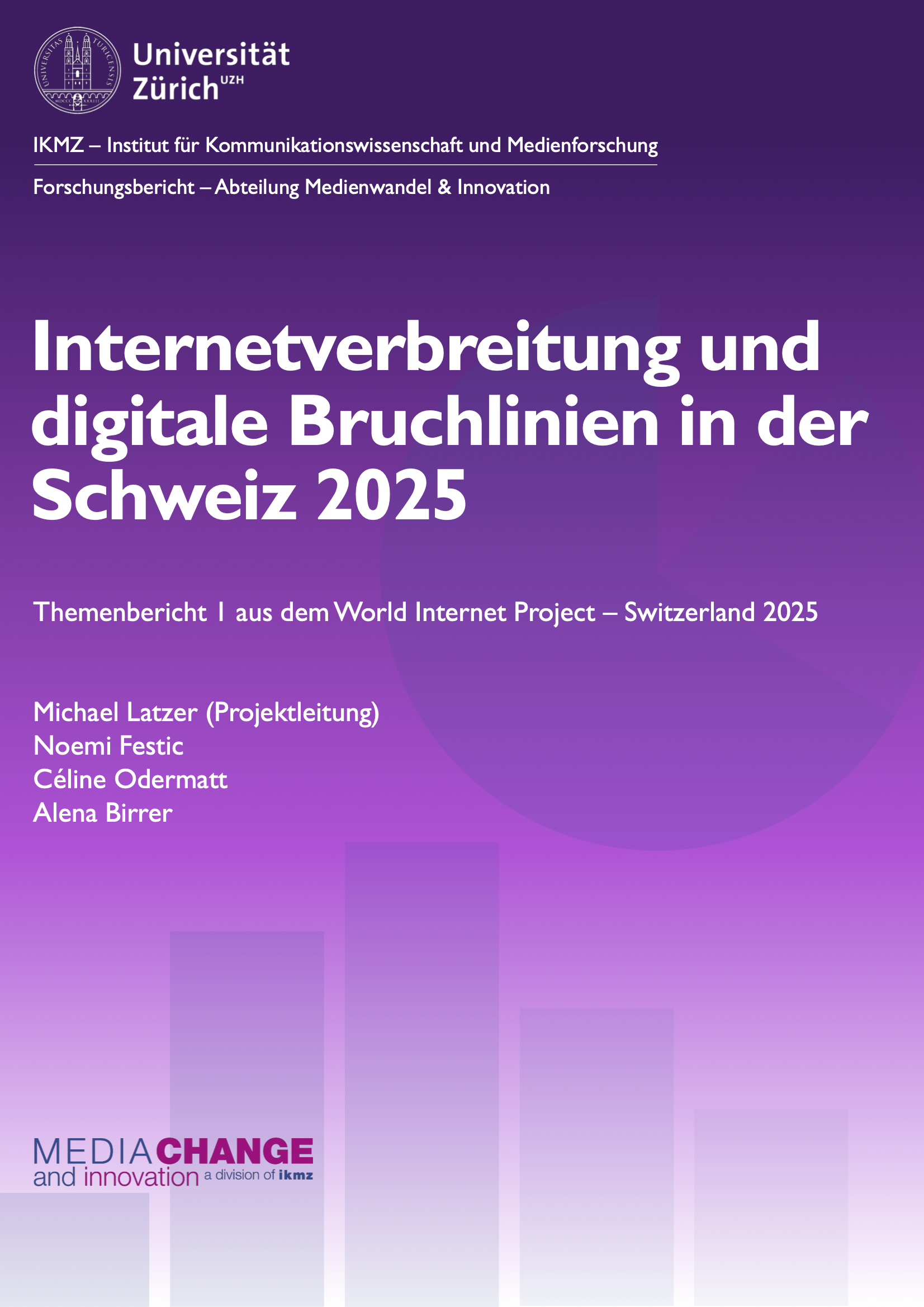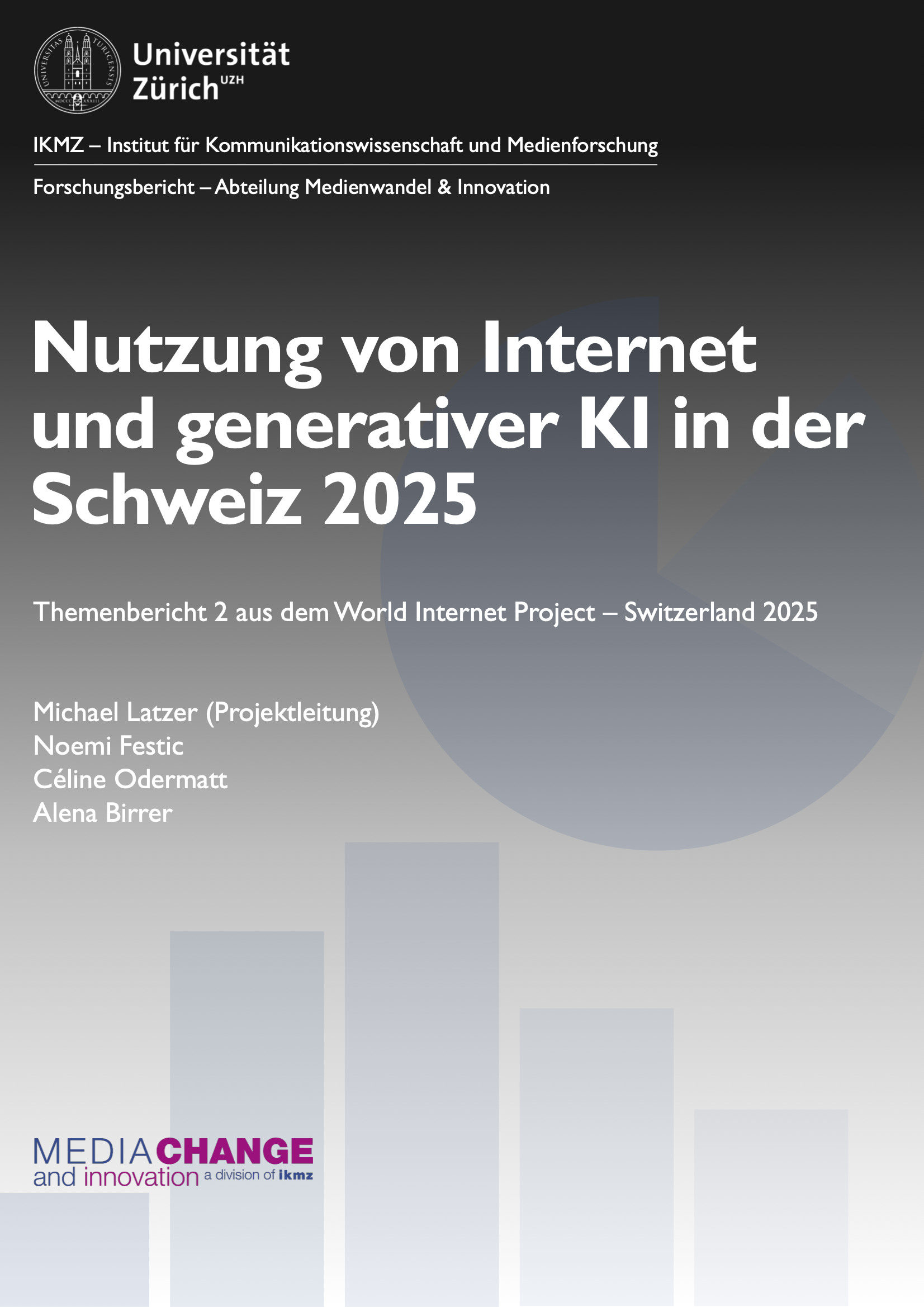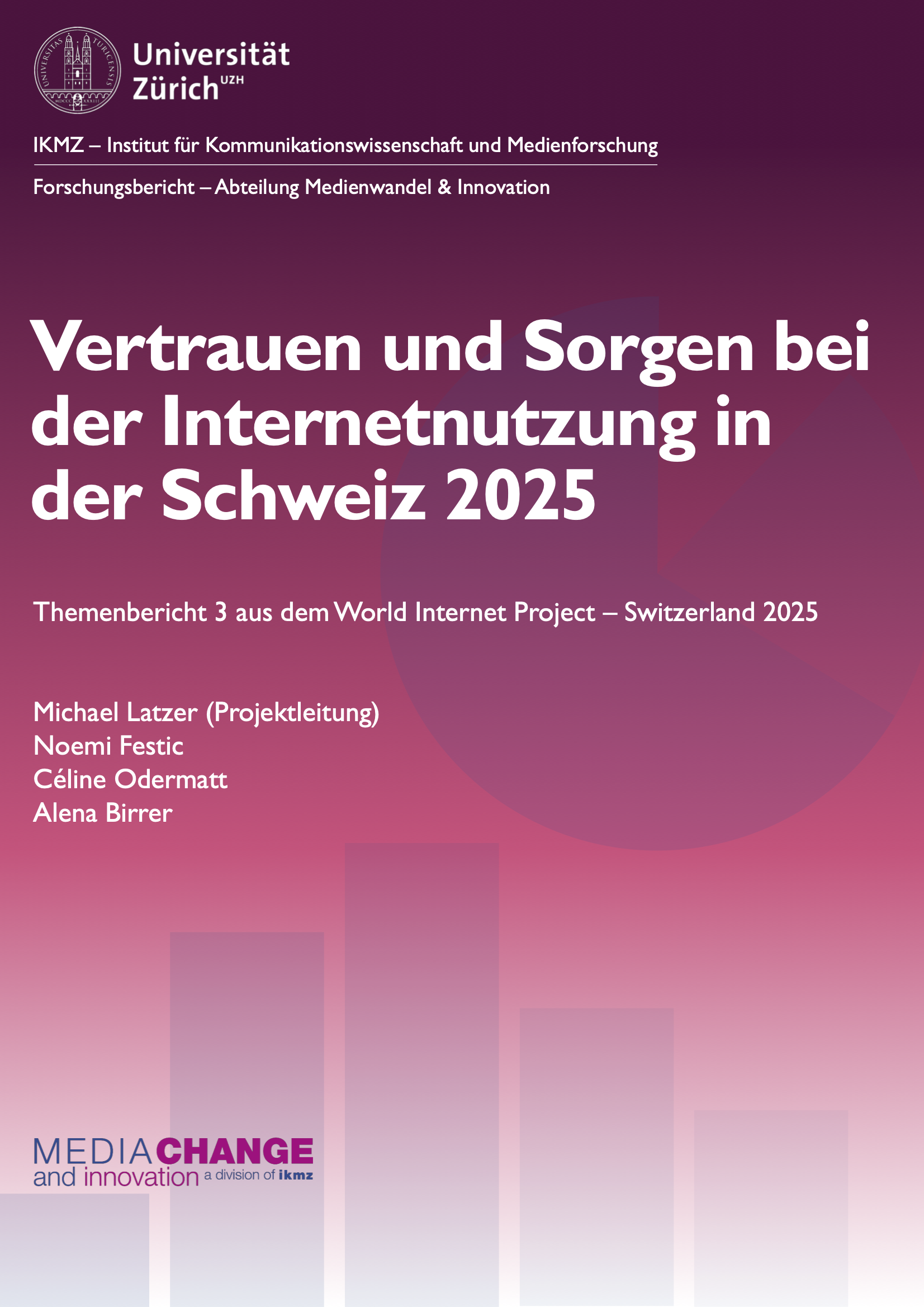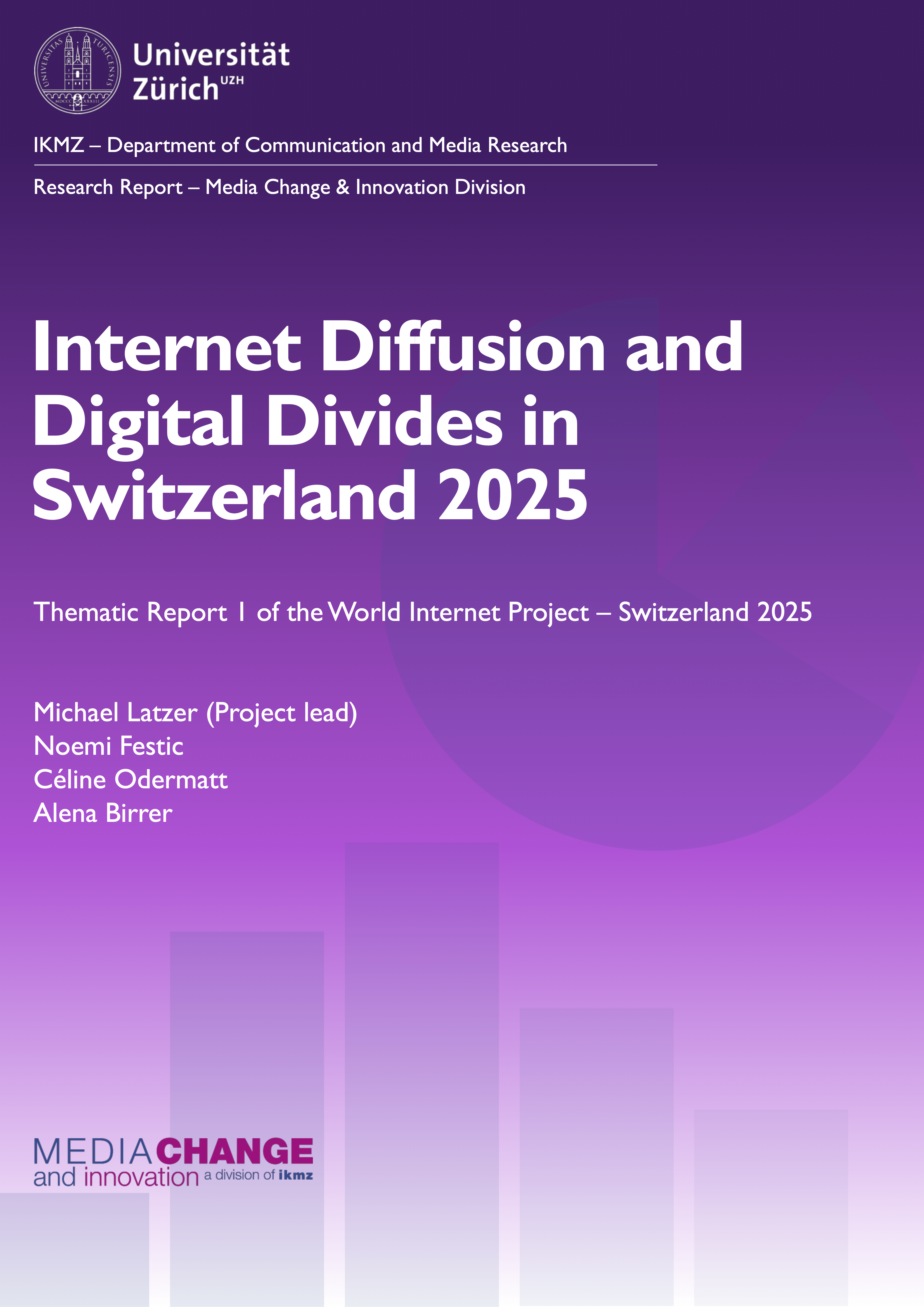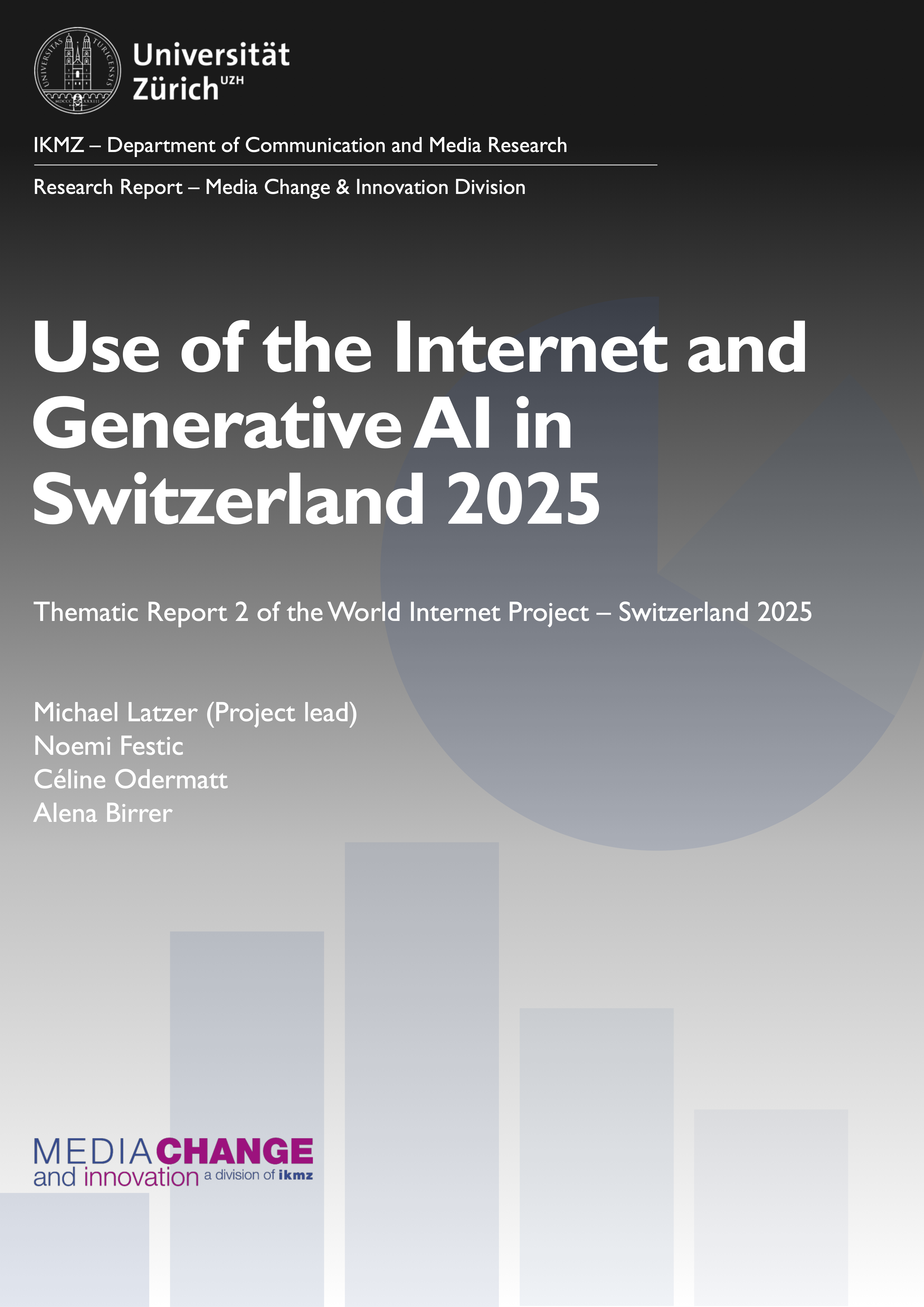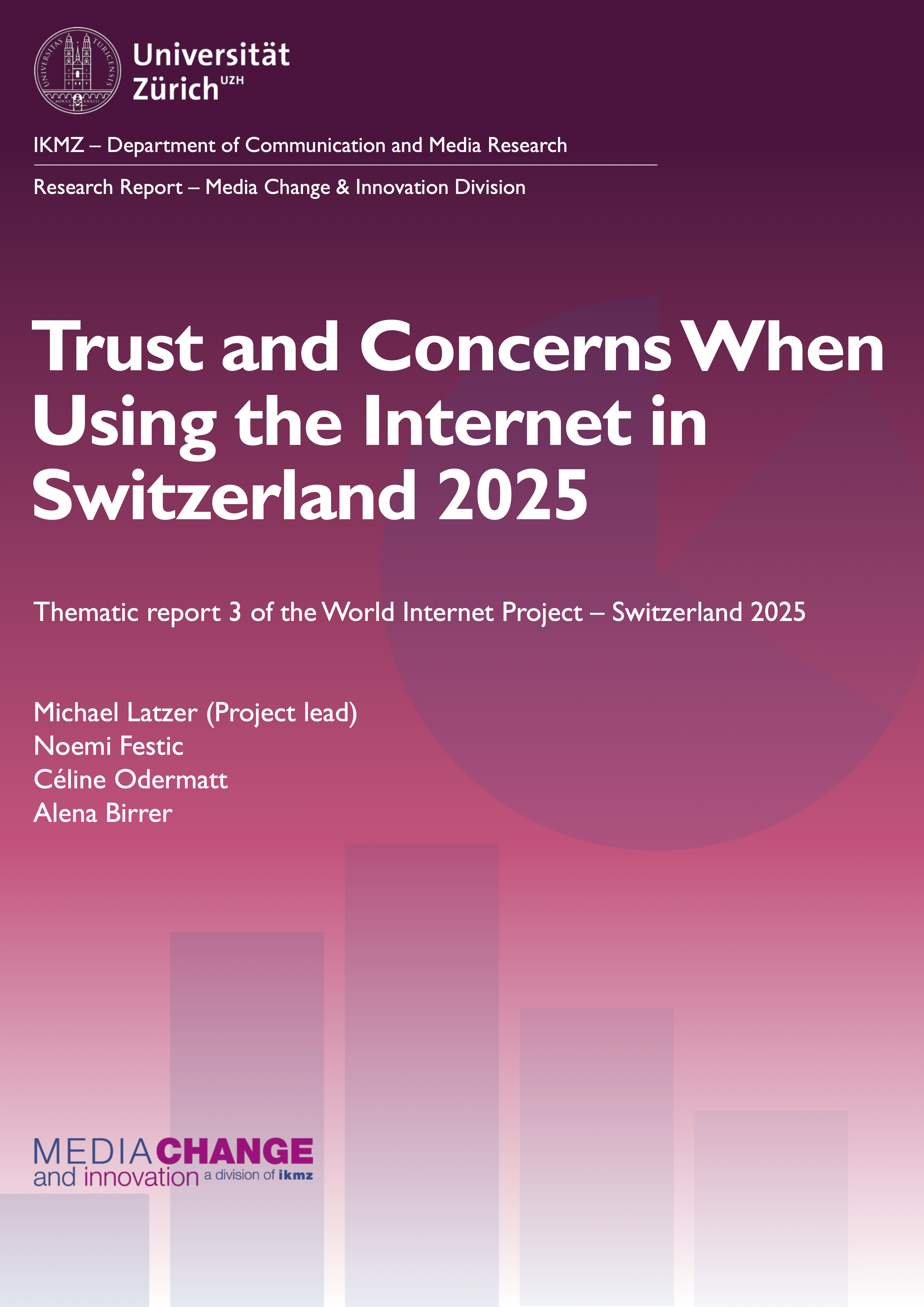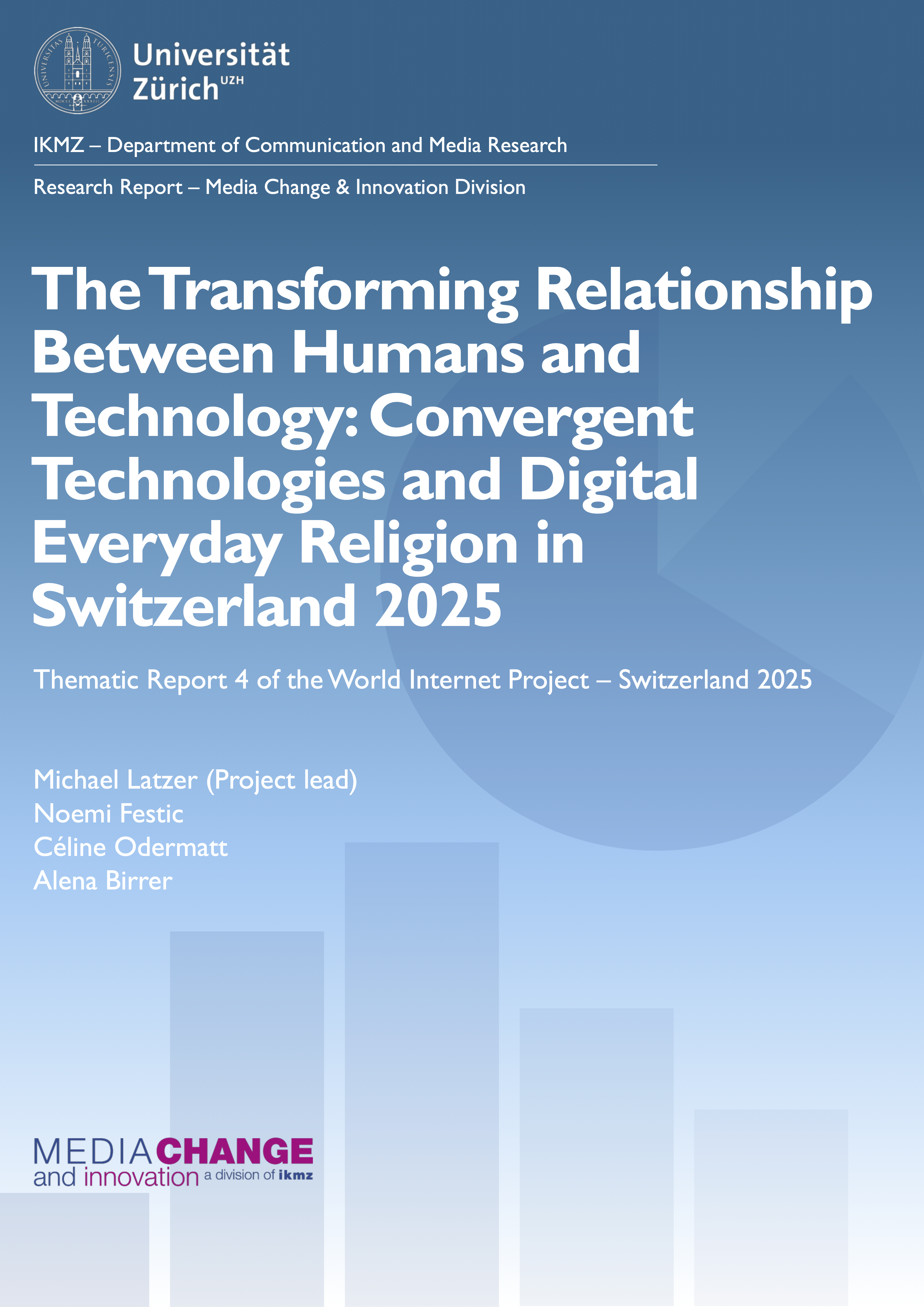Generative AI is Taking Over Everyday Life in Switzerland: From Experimentation to Regular Use
6th November 25Switzerland is more digital than ever and artificial intelligence is increasingly becoming part of everyday life. However, not everyone benefits equally: while younger people spend more time online than they would like, older people, those with low digital literacy and non-users of AI are falling behind. Most people in Switzerland are concerned about AI and the next generation of technology – but those who use AI regularly are more optimistic. These are the latest findings from the World Internet Project (WIP-CH) – Switzerland 2025, a representative long-term study by the University of Zurich. The WIP-CH has been examining internet use in Switzerland since 2011 and is now presenting the data for 2025.
Switzerland is online like never before: in 2025, people aged 20 to 29 spend an average of 8.4 hours per day online. The Swiss online population spends an average of 5.7 hours online each day – three times as much as in 2011 (1.8 hours) and two hours more than before the Covid pandemic in 2019 (3.6 hours). This generally increases the importance of digital life: “In 2025, for the first time, the internet is more important than personal contacts for 20- to 29-year-olds – both for information and for entertainment,” says study director Michael Latzer. Especially social media platforms such as TikTok and Instagram play a central role in the daily lives of young people (used by 95% of 20- to 29-year-olds), and their use is also increasing among older generations (58% among those aged 70+). The digitalization of everyday life is progressing rapidly: two out of three transactions (65%) are cashless, 39% of products are purchased online, and a third of work that can be done remotely is carried out from home (33%).
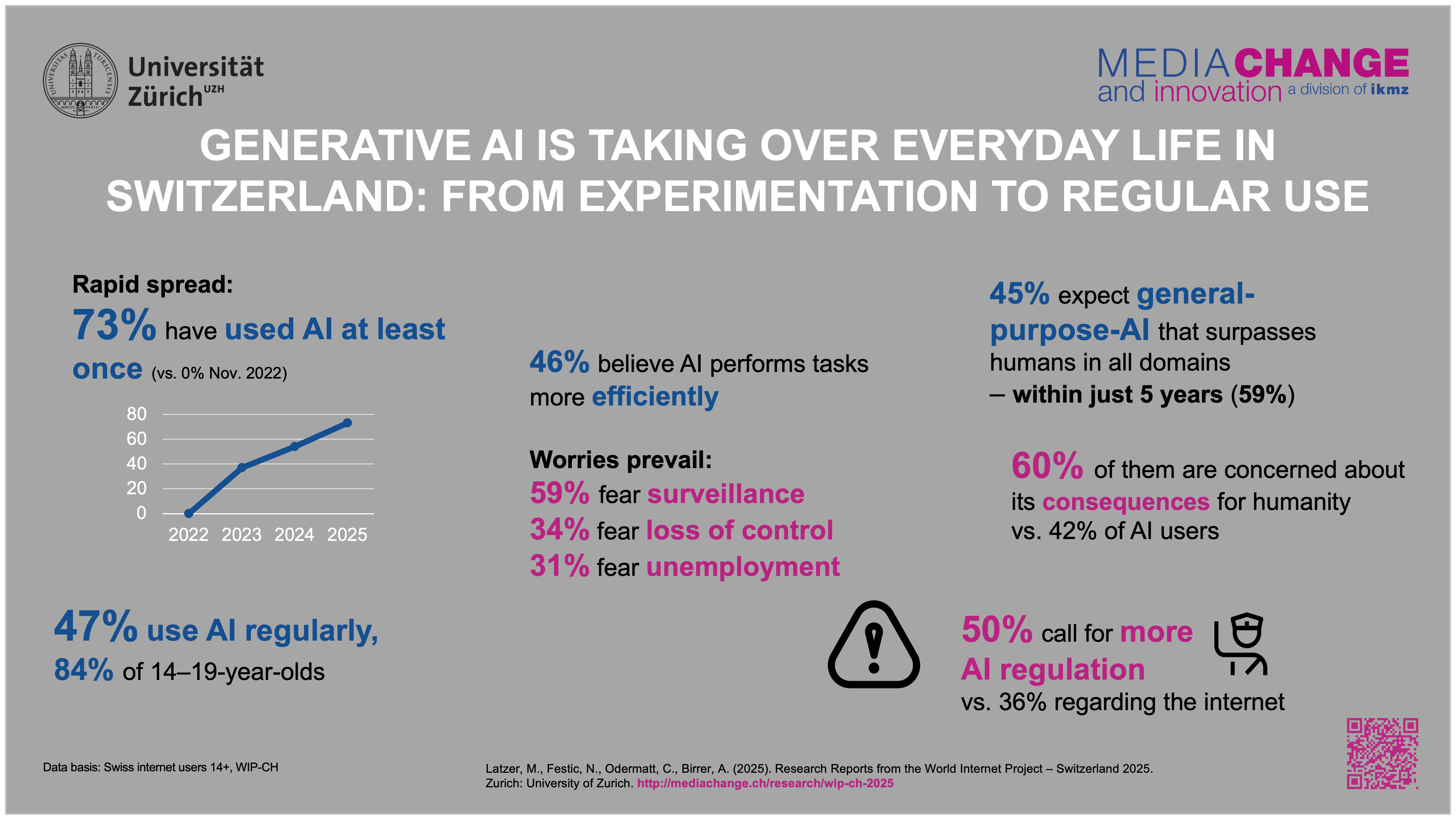
Almost half of Switzerland uses generative AI regularly: an unprecedented spread
Since the launch of ChatGPT in November 2022, the share of the population that has used generative AI has risen sharply. The share of the population that has already used such applications rose at record speed from 37% in 2023 to 54% in 2024 and 73% in 2025. What began as one-time experimentation has turned into regular use: nearly half of the population (47%) uses generative AI at least once a month (weekly: 21%, daily: 17%), and among 14- to 19-year-olds, the figure is as high as 84%. “Actual AI use is considerably higher, as AI is increasingly integrated into everyday services such as search engines and chatbots, often without being noticed”, explains Michael Latzer.
Generative AI is most commonly used in education and work (53%), with two-thirds of 20- to 29-year-olds doing so (64%). Three in ten (34%) 14- to 19-year-olds say they use AI to create content they were actually supposed to produce themselves. For many regular AI users, AI has also already become an important advisor for everyday decisions, for example regarding finances and career choices (21% each, compared to 3–4% among non-users). Among 14- to 19-year-olds, AI plays an important role in financial (29%) and health-related decisions (28%). However, compared to traditional sources, the overall importance of generative AI and influencers remains low: when it comes to political decisions, only 7% consider AI-generated information important, compared to 27% who rely on classic internet sources. Despite widespread use, skepticism remains: although a large majority of regular users are convinced that AI helps them complete tasks more efficiently (71%), only one-third (35%) believes that AI will improve life overall.
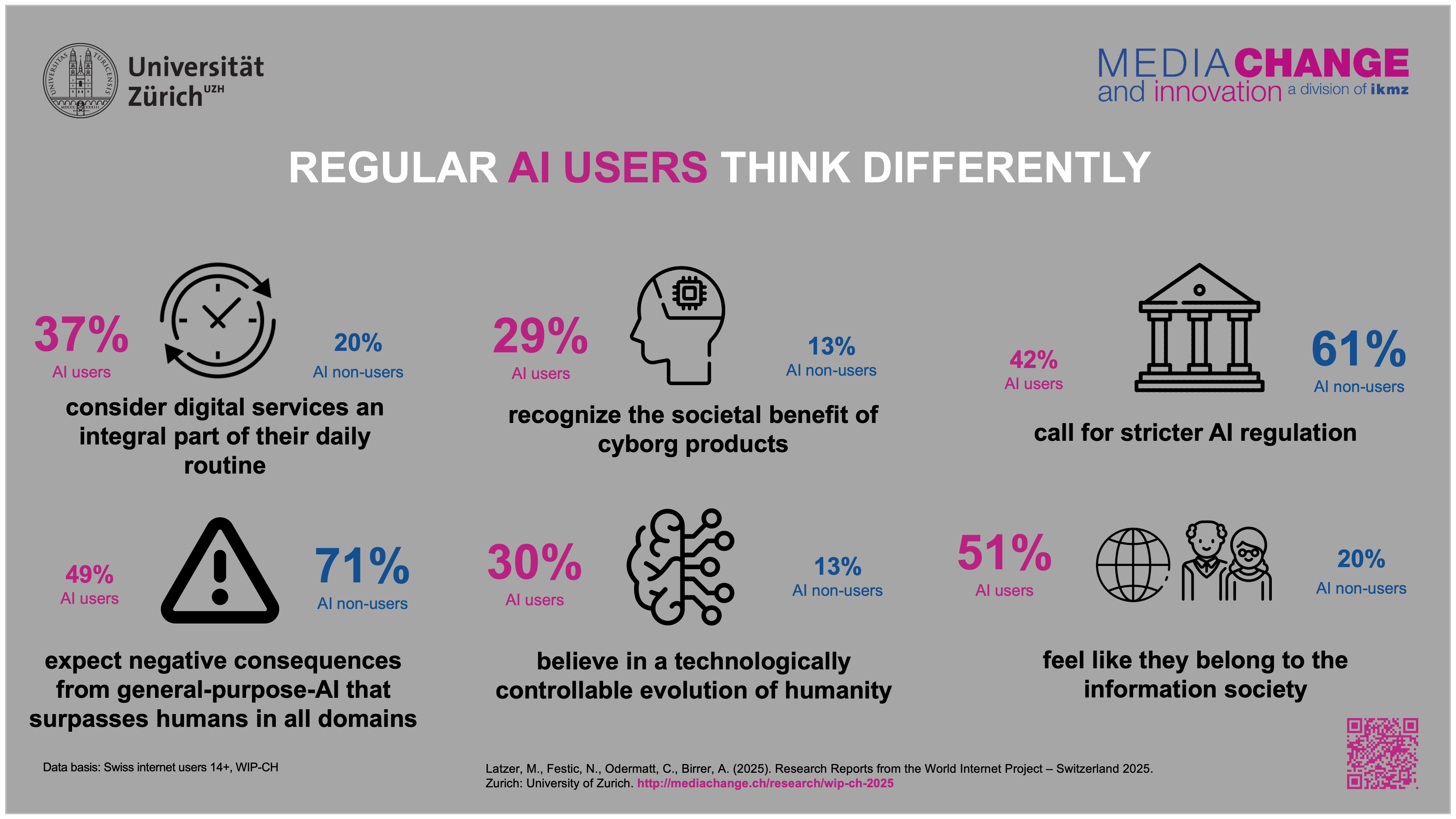
Surveillance, loss of control, and job fears – Switzerland calls for AI regulation
The Swiss population is concerned about the potential risks of AI: six in ten people in Switzerland (59%) fear increased surveillance, and one in three worries that generative AI could spiral out of control and spell the end of humanity (34%) or lead to mass unemployment (31%). Younger internet users tend to see the opportunities offered by generative AI, while older users tend to see the risks: for those under 30, the focus is on completing tasks more efficiently (58%), while for those aged 30 and above, the main concern is that generative AI could be used to monitor private life (58–66%). Accordingly, the demand for regulation is strong: one in two (50%) calls for stricter rules on generative AI – significantly more than for the internet in general (36%). Regular AI users are less likely to demand this (42%).
Half of Switzerland believes in “Artificial General Intelligence” and is worried about it
Almost half of Swiss internet users (45%) believe that generative AI will soon evolve into “Artificial General Intelligence” – a general-purpose application that surpasses humans in nearly all areas of life. More than half of them expect this to happen already within the next five years (59%). Those who use AI regularly are more likely to believe in the emergence of such “Artificial General Intelligence” (55%). However, this belief is accompanied by growing concerns about consequences: 60% of the population and 49% of AI users expect “Artificial General Intelligence” to have mostly negative effects on humanity. In contrast, attitudes toward the internet remain far more positive: 60% believe it is good for society.
Skepticism toward next generation of technology – risks of cyborg-products prevail
The next generation of technology combines internet-, bio-, and nanotechnologies with the aim of enhancing human abilities and overcoming biological limits – for example, through so-called cyborg products. While Silicon Valley has high hopes for such future technologies, the Swiss population remains skeptical: only one-fifth (21%) believes in this potential, rising to 30% among AI users. The majority, however, sees mainly risks, such as new forms of cybercrime (78%), privacy violations (67%), and social inequality (64%).
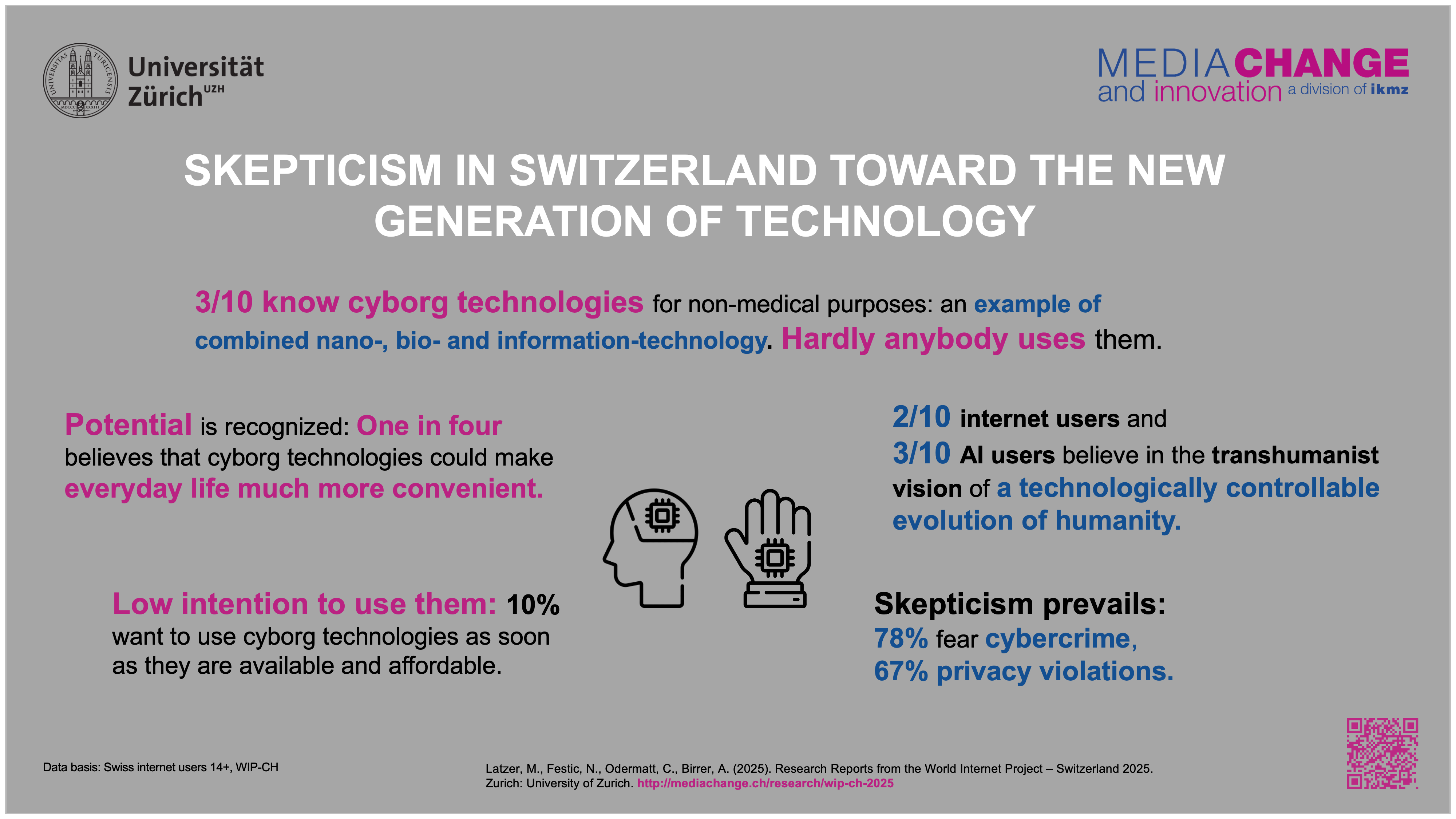
AI fuels digital divides: some lose time, others fall behind
Social divides in digitalization follow age and internet skills, reinforced by the use of AI. While 91% of 20- to 29-year-olds in Switzerland rate their internet skills as good to excellent, this applies to only 59% of those aged 70 and above. The difference is even more pronounced when it comes to generative AI: almost half of 14- to 19-year-olds (45%) feel comfortable using it, but only 20% of those aged 70 or older do. These differences are reflected in the sense of belonging to the information society. Only 34% of the population feel part of it, 25 percentage points less than in 2015. The sense of inclusion is particularly low among older people (19% among those 70+) and those with lower internet skills (14%), while 20- to 29-year-olds and people with high internet skills feel significantly more integrated (54% each). Those who use AI regularly feel more included (51% vs. 20% among non-users).
Digitalization also has its downsides: while older people and those who do not use AI risk being left behind, younger people and AI users struggle with digital overuse. More and more people now spend more time online than they would like (38% vs. 24% in 2019). Among 14- to 19-year-olds, 82% want to reduce their internet use time, as do 58% of AI users.

- News Release WIP-CH 2025 (in English)
- News Release WIP-CH 2025 (in German)
- News Release WIP-CH 2025 (in French)
- News Release WIP-CH 2025 (in Italian)
Research Reports 2025 in German (Themenberichte)
- Internetverbreitung und digitale Bruchlinien in der Schweiz 2025
- Nutzung von Internet und generativer KI in der Schweiz 2025
- Vertrauen und Sorgen bei der Internetnutzung in der Schweiz 2025
- Mensch-Technik-Beziehung im Wandel: Konvergierende Technologien und digitale Alltagsreligion in der Schweiz 2025
Research Reports in English
- Internet Diffusion and Digital Divides in Switzerland 2025
- Use of the Internet and Generative AI in Switzerland 2025
- Trust and Concerns When Using the Internet in Switzerland 2025
- The Transforming Relationship Between Humans and Technology: Convergent Technologies and Digital Everyday Religion in Switzerland in 2025
Infographics
- The digitalization of everyday life is overburdening young people (English / German)
- Generative AI is taking over everyday life in Switzerland: from experimentation to regular use (English / German)
- Increasing use of digital services in everyday life in Switzerland (English / German)
- Digitalization level before, during and after the Covid pandemic (English / German)
- Digitalization push raises concerns in Switzerland (English / German)
- The young and the old differ regarding generative AI (English / German)
- Regular AI users think differently (English / German)
- Skepticism in Switzerland toward the new generation of technology (English / German)
- Increasing self-censorship in Switzerland due to perceived online surveillance (English / German)
- Internet use is becoming an everyday religion especially among young people in Switzerland (English / German)
Selected Graphs
- Knowledge and Use of Generative AI Over Time, 2022–2025 (English / German)
- Knowledge and Regular Use of Generative AI by Age, 2025 (English / German)
- Use Purposes of Generative AI, 2025 (English / German)
- Assessment of Risks and Opportunities of Generative AI, 2025 (English / German)
- Assessment of Selected Risks und Opportunities of Generative AI by Age, 2025 (English / German)
- Assessment of Risks and Opportunities of Generative AI by Use, 2025 (English / German)
- Belief in the Emergence of General Artificial Intelligence, 2025 (English / German)
- Average Daily Internet Use Time over Time 2011–2025 (English / German)
- Desire to Reduce Internet Use Time by Age, 2025 (English / German)
- Sense of Belonging to the Information Society by Internet Skills Over Time 2015–2025 (English / German)
- Perceived Benefits of the Internet and Converging Technologies Over Time 2023–2025 (English / German)
- Indicators of Transhumanist Belief, 2025 (English / German)
Icons made by Freepik, Ehtisham Abid, monkik and juicy_fish from www.flaticon.com

